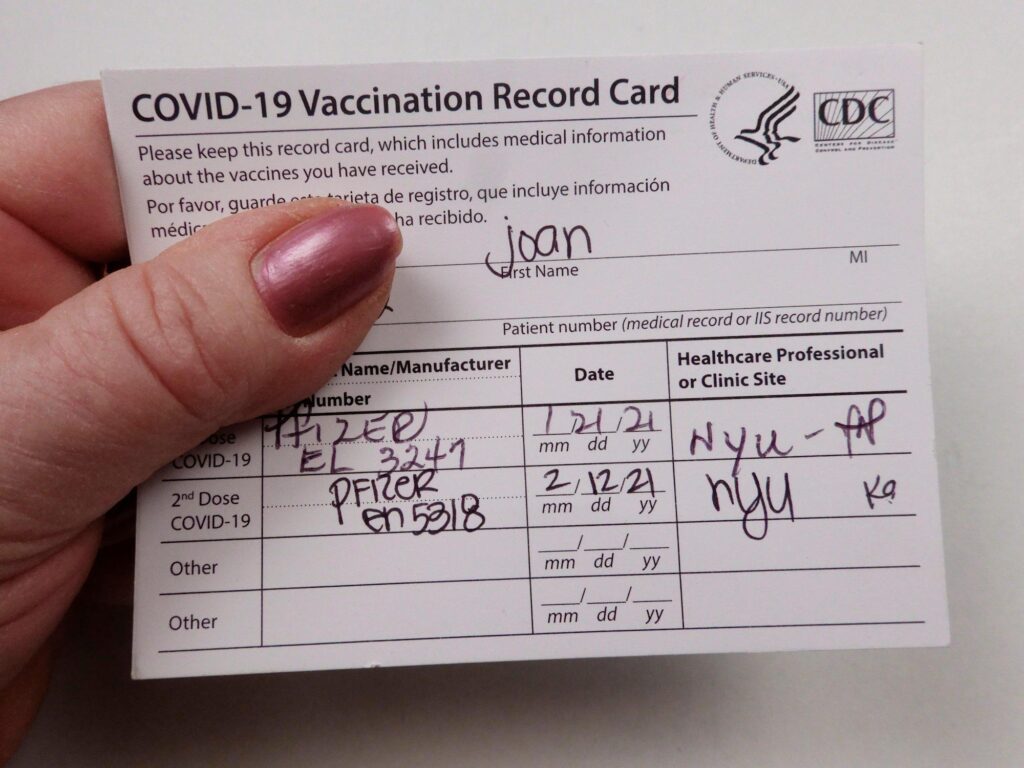[ad_1]
Patient holding COVID-19 vaccination record card. Joan Slatkin/Education Images via Getty Images
COVID-19 vaccine cards remind recipients when to get a second dose of the Moderna or Pfizer vaccine.
The CDC recommends taking a photo of vaccine cards as a backup, but avoid posting them online.
Go back to where you got inoculated if you misplace your paper card.
Visit the Business section of Insider for more stories.
Millions of newly inoculated Americans are walking home with paper vaccine cards containing crucial information about their COVID-19 vaccine.
The CDC-issued COVID-19 vaccine cards serve as reminders for when to get a second dose of the Moderna or Pfizer vaccine.
The card also works as proof that you’ve gotten your shot. In some states, that piece of paper that doesn’t quite fit in most wallets will double as a pass to dine at restaurants, go to the gym, or see indoor performances.
What happens if you lose the small paper card? You can still get a second dose, but the CDC recommends taking a photo of the card upon receiving it for your own records. (Remember not to share photos of your vaccine card on social media.)
Here’s everything to know about your COVID-19 vaccine card:
What are COVID-19 vaccine cards?
The Trump administration designed the cards as ways to remind vaccine recipients when to get a second dose. Recipients or their vaccine providers write when they got the first dose and what shot they received on the cards.
The Moderna vaccine requires two doses taken four weeks apart, and the Pfizer vaccine requires two shots three weeks apart. The Johnson & Johnson vaccine requires just one dose.
Read more: A new kind of healthcare startup wants health insurers to pay for meal kits and groceries for food insecure seniors
The US designed the card system to encourage vaccine recipients to show up for second doses, as some studies show a significant number of women did not return to get second doses of the human papillomavirus vaccine. A recent CDC study showed the vast majority of COVID-19 vaccine recipients are returning for second doses.
Story continues
Though one shot of Pfizer and BioNTech can significantly reduce risk of catching infection, the body takes weeks to build immunity. Data from rigorous trials suggested the Moderna and Pfizer vaccines provide near 100% protection against hospitalization and death, but only when participants followed the two-shot protocol.
What do you need COVID-19 vaccine cards for?
The Centers for Disease Control and Prevention is not collecting vaccine information when Americans go to get shots; the information on paper cards do not go into an online CDC database.
Therefore, the vaccine cards can work as proof that you’ve been inoculated at least once. Many states have their own system for tracking when patients receive vaccines, as do hospitals, clinics, and other organizations store information about vaccines, a CDC spokesperson told McClatchy News.
Some businesses, states, and cities are looking into ways to use proof of vaccines to allow for better opening protocols. The International Air Transport Association, or the trade association of international airlines, is working on ways to digitize vaccine cards. Nick Careen, a senior vice president at IATA, told The Points Guy paper vaccine cards are easy to forge, but digital versions can help the airline industry reopen.
In New York City, the Excelsior Pass app acts as a digital vaccine passport for residents and visitors. Users can enter their vaccine information or confirm that they’ve recently tested negative for COVID-19, and they get a QR code to show venues and business that they are vaccinated and/or negative. This will come in handy when NYC requires proof of vaccination to participate in indoor activities starting August 16.
What happens when you lose a COVID-19 card?
Unlike the UK, the US federal government has not opted to create a national app or system of vaccine verification. New Yorkers can use their Excelsior Passes as backup in the case they lose their paper cards, and other states may see similar systems pop up in the future.
The federal government suggests taking a photo of your vaccine card in case it gets lost. The Better Business Bureau warned not to post the pictures on social media. The BBB, a non-profit consumer advocacy group, reported scammers had tried selling fraudulent vaccine cards online.
The card also contains personal information that hackers can use to get access to your accounts, the BBB said.
If you got a vaccine at Walmart and Sam’s Club, you will soon be able to access your vaccination records digitally through CommonPass. CommonPass, a digital passport with information on COVID tests and vaccine status, is being developed in partnership with The World Economic Forum and is still in trial stages.
Read more: Is it a crime to give away leftover COVID shots? Doctors and other healthcare workers fear legal consequences as they wait for Justice Department guidance.
If you misplace the card without having created a backup, Amesh Adalja, senior scholar at the Johns Hopkins University Center for Health Security told ABC News to go back to the place you got a shot and ask for a replacement. Knowing the manufacturer (Moderna or Pfizer) and the recommended time to your second shot is imperative for decreasing your chances of infection, AARP said.
And, if you can, hold on to your card after getting a second dose in case officials decide to use them for other purposes, like schools, Crystal Tubbs, associate director of pharmacy at Ohio State University, told Good Housekeeping.
“Not all medical record systems ‘talk’ to each other, so this card serves as a backup of the most important information,” Tubbs said.
Read the original article on Business Insider
[ad_2]
Source link
